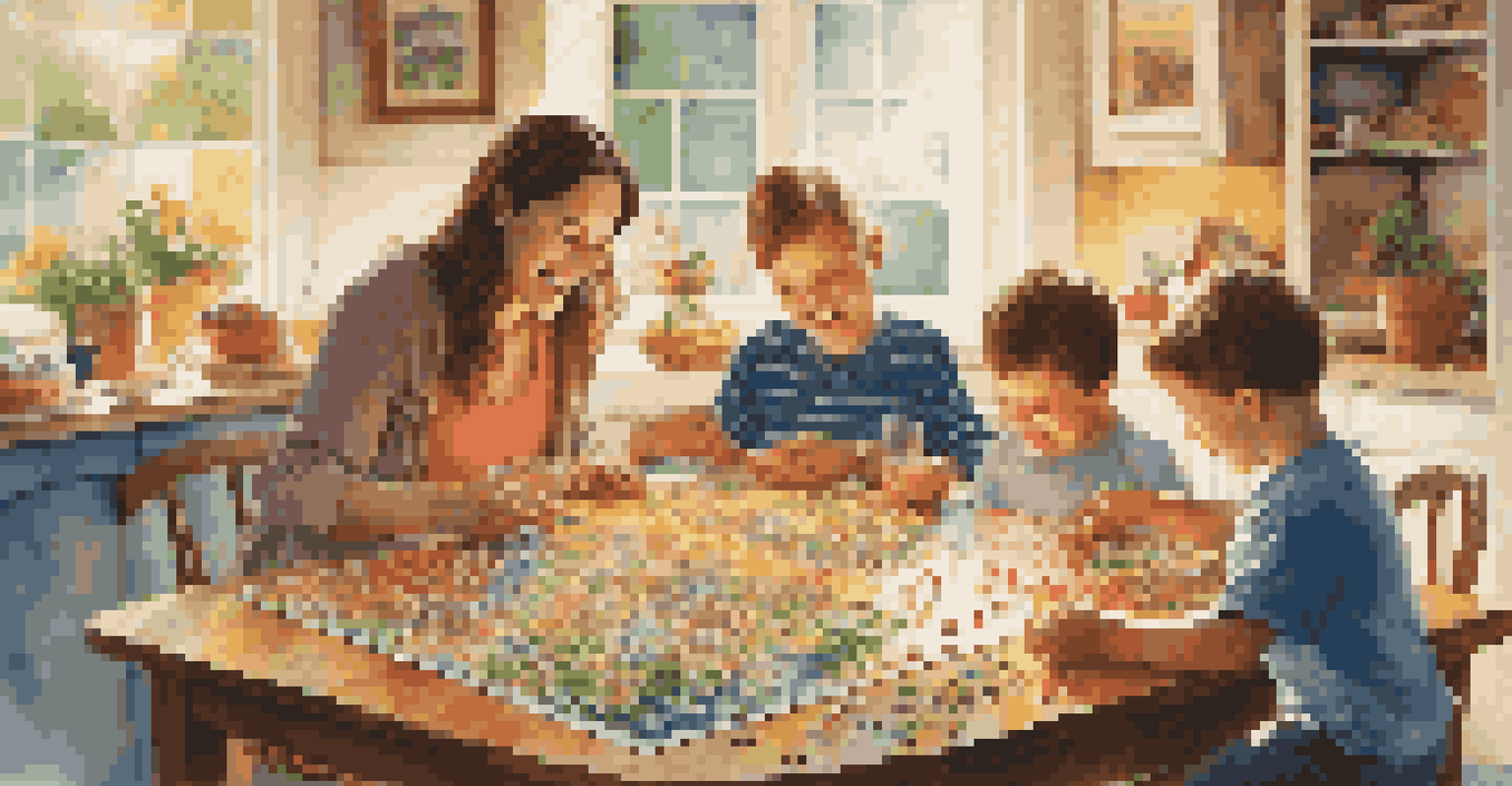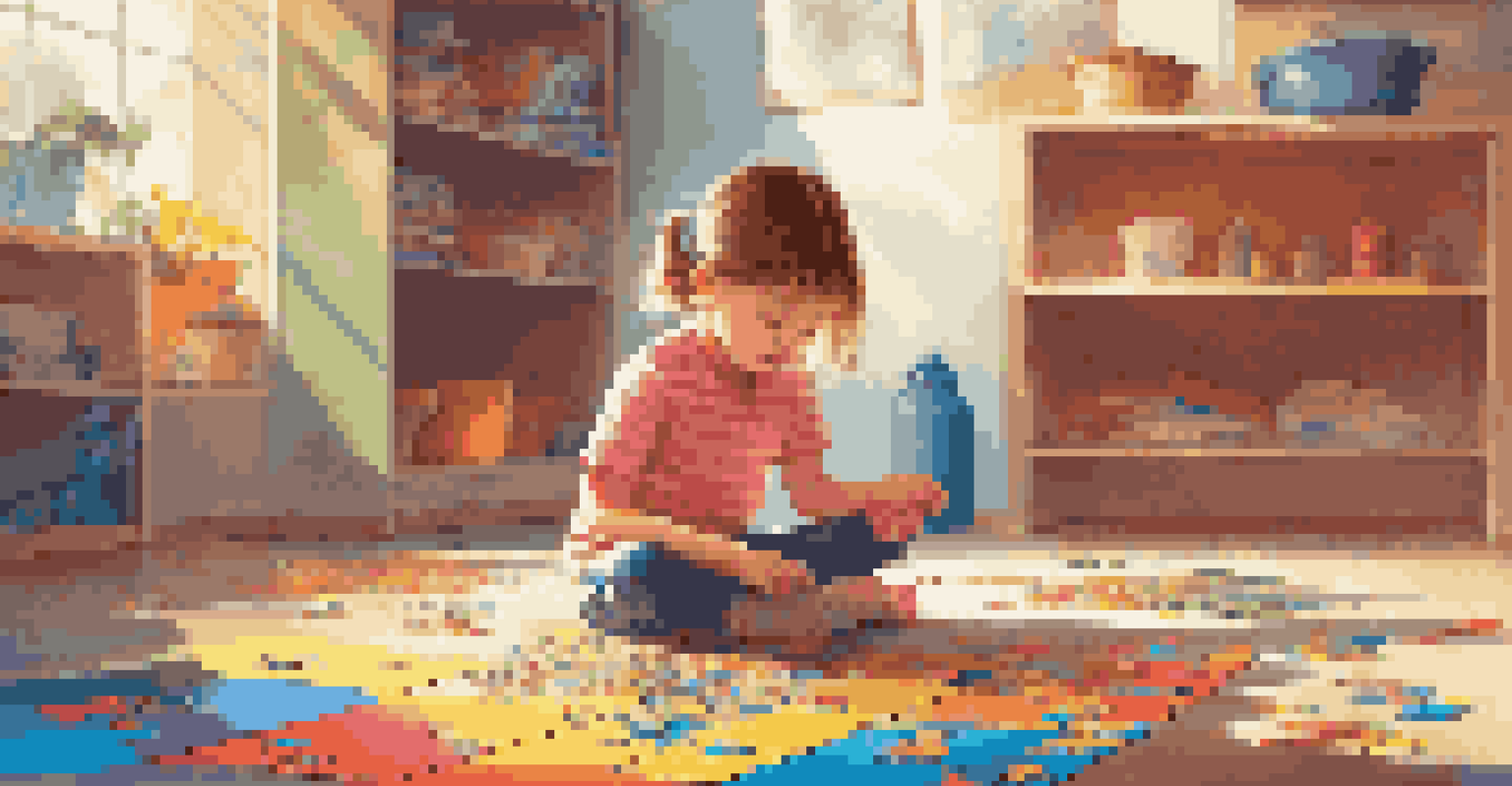How to Encourage Children to Solve Puzzles Regularly

Understanding the Benefits of Puzzle Solving
Puzzles are not just a fun activity; they offer a wealth of cognitive benefits for children. Solving puzzles helps improve critical thinking, enhances memory, and boosts problem-solving skills. These skills are essential not just for academics but for everyday life, as they teach kids to approach challenges with creativity and perseverance.
The essence of mathematics is not to make simple things complicated, but to make complicated things simple.
Moreover, puzzles can also foster patience and resilience. When kids encounter a tough puzzle, they learn the importance of persistence. This experience translates into other areas of their lives, teaching them that hard work often leads to rewarding outcomes.
Finally, engaging with puzzles can enhance fine motor skills, especially for younger children. As they manipulate pieces, they develop hand-eye coordination and dexterity, laying a foundation for future skills like writing and drawing.
Creating a Puzzle-Friendly Environment at Home
To encourage puzzle-solving, start by creating a dedicated space in your home. This could be a cozy corner with a small table where puzzles can be laid out and worked on at any time. A designated area not only signifies the importance of puzzles but also makes it more inviting for kids to engage with them.

Make sure to stock your puzzle area with a variety of options that cater to different skill levels and interests. From jigsaw puzzles to brain teasers, having an assortment can spark curiosity and keep kids coming back for more. Additionally, rotating the puzzles every so often can maintain their interest and challenge.
Puzzles Boost Cognitive Skills
Engaging in puzzle-solving enhances critical thinking, memory, and problem-solving skills in children.
Lastly, ensure that this space is free from distractions. A quiet, comfortable area can help children focus better on the task at hand, allowing them to immerse themselves fully in the puzzle-solving process.
Incorporating Puzzles into Family Activities
One of the best ways to encourage children to solve puzzles regularly is to make it a family affair. Set aside time each week dedicated to working on puzzles together, turning it into a fun tradition. This not only boosts motivation through social interaction but also fosters family bonding.
Play is the highest form of research.
Introduce friendly competition by timing how fast each family member can complete a puzzle or see who can find the most pieces in a set time. Such playful challenges can make puzzle-solving exhilarating and instill a sense of achievement in children.
Additionally, sharing stories or memories related to puzzles can create a richer experience. Discussing how you enjoyed puzzles as a child or recalling funny moments from past family puzzle nights can make the activity feel special and memorable.
Choosing the Right Puzzles for Your Child
Selecting the appropriate puzzles is crucial in keeping children engaged. Start with simpler puzzles that match their age and skill level, gradually increasing the difficulty as they become more confident. This step-by-step approach helps prevent frustration and keeps their motivation intact.
Consider your child’s interests when choosing puzzles. If they love animals, look for puzzles featuring wildlife. If they’re into space, find puzzles with planets and stars. Aligning puzzles with their passions makes the activity more relatable and enjoyable.
Creating a Puzzle-Friendly Space
Establishing a dedicated area for puzzles encourages kids to engage and fosters a love for solving challenges.
Lastly, don’t forget about the educational aspect of puzzles. There are plenty of themed puzzles that teach geography, history, or even math concepts in a fun way. Incorporating learning into playtime can make puzzle-solving both entertaining and enriching.
Setting Goals and Celebrating Achievements
Setting small goals can provide children with a sense of direction when tackling puzzles. For instance, aim to complete a certain number of puzzles each month or challenge them to solve a particular puzzle within a specific timeframe. These goals can instill a sense of purpose and accomplishment.
Celebrating achievements, no matter how small, is key to fostering a positive attitude towards puzzle solving. Acknowledge their efforts with praise or small rewards when they reach their goals. This recognition can motivate them to keep pushing their boundaries.
Consider creating a 'Puzzle Wall' where completed puzzles can be displayed. This visual representation of their accomplishments can serve as a constant reminder of their progress and encourage them to take on new challenges.
Using Technology to Enhance Puzzle Solving
In today’s digital age, many children are drawn to screens, so why not use that to your advantage? There are countless apps and online platforms that offer interactive puzzles. These digital options can introduce children to new types of puzzles they might not encounter in traditional formats.
Many online puzzle games also incorporate educational elements, such as math challenges or vocabulary building. This blend of learning and fun can keep kids engaged for longer periods and encourage them to solve puzzles more frequently.
Encouraging Family Puzzle Time
Making puzzles a family activity promotes bonding and motivation, turning problem-solving into a fun tradition.
However, it’s essential to balance screen time with traditional puzzles. Encourage kids to switch between digital and physical puzzles to enjoy the benefits of both forms. This variety can help maintain their interest and broaden their puzzle-solving skills.
Encouraging Peer Engagement with Puzzles
Social interaction can greatly enhance a child’s interest in puzzles. Encourage your child to invite friends over for a puzzle playdate. This not only makes the activity more enjoyable but also allows them to learn from one another and share different solving strategies.
Consider organizing puzzle-themed parties or playgroups. These events can involve various puzzle competitions, which can be both exciting and motivating for kids. The friendly atmosphere can boost their enthusiasm for puzzles.

Additionally, joining community puzzle contests or clubs can provide children with a sense of belonging and challenge. Meeting others who share similar interests can inspire them to engage with puzzles more regularly.
Making Puzzle Solving a Lifelong Habit
Encouraging regular puzzle solving is about instilling a love for the activity rather than making it a chore. By creating a positive environment and integrating it into daily life, children can naturally develop a habit of enjoying puzzles. It’s all about making it fun and accessible.
Lead by example! Show your enthusiasm for puzzles by solving them yourself. Children often mimic adult behavior, so your passion can inspire them to engage with puzzles more frequently.
Finally, remind them that puzzles are not just a pastime, but a gateway to learning and growth. With the right encouragement, children can learn to appreciate puzzles as a valuable part of their development, ensuring that they carry this love for problem-solving into adulthood.